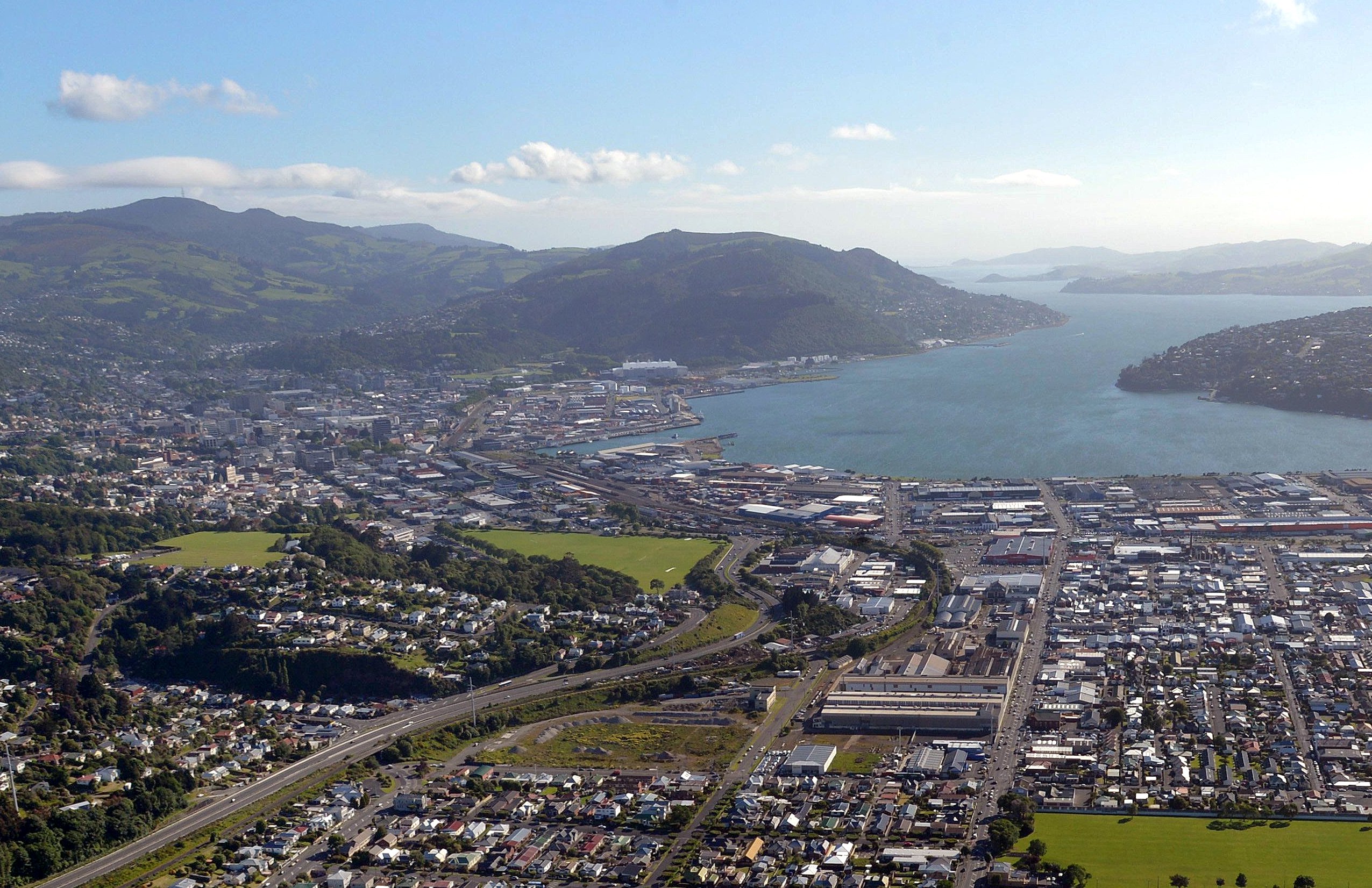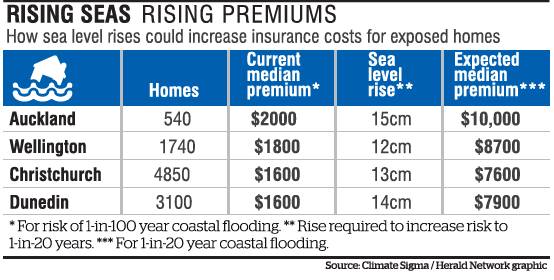
That is the stark warning from a major new report assessing how insurers might be forced to confront New Zealand’s increasing exposure to rising seas, prompting calls for stronger government action before it is too late.
COULD YOU BE AFFECTED? EMAIL US |
Nationally, about 450,000 homes that currently sit within a kilometre of the coast are likely to be hit by a combination of sea-level rise and more frequent and intense storms under climate change.
The report, published through the Government-funded Deep South Challenge, looked at the risk for around 10,000 homes in Auckland, Wellington, Christchurch and Dunedin that lie in one-in-100-year coastal flood zones.
In Dunedin 3100 such properties could see premiums leap from $1600 to $7600 and $7900, with 13cm and 14cm of sea-level rise respectively.
That risk is expected to increase quickly.
In Wellington, only another 10cm of sea-level rise - as is expected by 2040 - could push up the probability of a flood five-fold, making it a one-in-20-year event.

International experience and indications from New Zealand’s insurance industry suggest that companies start pulling out of insuring properties when disasters like floods become one-in-50-year events.
By the time that exposure has risen to one-in-20-year occurrences, the cost of insurance premiums and excesses will have climbed sharply, if insurance could be renewed at all.
The report found around 540 exposed homes in Auckland, with current median coastal flood premiums for once-in-a-century events of $2000, could reach that one-in-20-year threshold with just 15cm of sea-level rise.
If insurance was still available at that point, premiums would have soared to $10,000.
For the 1740 Wellington homes modelled, median premiums could jump from $1800 to $8700 with seas 12cm higher.
The research also suggested that just small increases in sea-level rise would likely cause at least partial retreat by insurers for the majority of those 10,000 homes, within only 15 years.
Insurance remained a requirement for residential mortgages, and failing to maintain them could trigger defaults.
While mortgages were often granted with repayment periods of up to 30 years in New Zealand, insurance contracts were renewed annually.
An insurer could exit a market within 12 months, while a lender could still have decades before their loans matured.
Despite rules requiring mortgagees to insure, a general absence of compliance checks meant banks did not know whether some properties they mortgaged remain insured beyond the first year of ownership.
Insurance Council of New Zealand chief executive Tim Grafton expected climate risks would continue to be signalled by insurers through means like price and excesses.
‘‘Insurers are likely to continue to cover existing homeowners in climate change or natural hazard-threatened areas, but we can expect premiums and excesses will increase,’’ Mr Grafton said.
“That might mean a flood plain property will have a $500 excess for fire damage but a $10,000 excess for flood damage.
“However, some companies might choose not to take on new customers in areas that have a known higher risk to sea-level rise and flooding in 15 to 20 years.’’
Insurers needed to work with customers to ensure they understood the reasons and costs that came with pricing certain risks, he said.
But all the while, homeowners were still choosing to buy, develop and renovate coastal property, and new houses were being built in climate-risky locations.
“People tend to be very good at ignoring low-probability events,’’ the report’s lead author, Dr Belinda Storey, of Climate Sigma, said.
“This has been noticed internationally, even when there is significant risk facing a property.
“Although these events, such as flooding, are devastating, the low probability makes people think they’re a long way off.’’
Dr Storey felt that market signals were not enough to effect change — and she said the Government could play more of a role around informing homeowners of risk.
Mr Grafton said the sector continued to push for adaptation measures and backed a recent recommendation for the Government to create a dedicated Climate Change and Managed Retreat Act.
“We also strongly advocate for local government to take a long view out 50 to 100 years and not to consent to developments in high-risk areas,’’ he said.
“The sooner we adapt to our changing climate, the less adaptation will cost us and the less we will be impacted by the increasing frequency and severity of storms.’’
Local Government New Zealand agreed clear adaptation legislation, guiding where people could live and build, would also help councils currently “stuck between a rock and sea-level rise’’.
“Certainty in the adaptation space would also help insurers, and make their business model more sustainable and less prone to sudden swings in risk pricing,’’a spokesperson said.
Climate Change Minister James Shaw said nationwide risk had been mapped out by an assessment published this year.
“Based on this, we are currently working on a national adaptation plan, which will set out how we plan to ensure communities are more resilient to the impacts of climate change.’’
Comments
So they know which houses.... Are us homeowners going to be told? Or just sit and wait till we get whacked with massive increases to insure against the climate change scam to line these devil's pockets?
If nothing happens in 10 years, I'll be demanding a rebate, from insurers, or this useless virtue signalling government
The assessment has been published, Truthintime.
The 2nd Generation Plan for Dunedin has been in the works for a few years now... it includes updated hazard zones which cover affected flood areas. And any insurance increase will be noted before it occurs, or haven't you had insurance renewals before?
You say insurance companies are now devils that are part of this global scam - along with governments from China to New Zealand, universities from Harvard to Oxford, tens of thousands of researchers who've spent decades of their lives in the field?! All in it together, for what exactly? Just because you don't like the conclusions doesn't make it a scam.
From the IPCC 1990 - 1992 Assessment.
"The largest impacts on humanity of climate change may be on human settlement, with the existence of entire countries such as the Maldives, Tuvalu, and Kiribati imperilled by a rise of only a few metres in sea-levels"
From Newshub 2020
"Low-lying Pacific island continuing to expand despite sea level rise - scientists"
"A low-lying inhabited island in the Pacific thought to be at risk from rising sea levels has actually increased in size since 1943, scientists say.
And the new research from Auckland University researchers and their Canadian counterparts suggests the island isn't alone."
About time we spread more fear so we can create a global socialist utopia, with China as the global power.
About time a climate emergency was declared because facts are starting to get in the way of the truth and that would be detrimental to The Great Reset and the Build Back Better programs.
I always find your comments very amusing, maybe you could write a regular opinion piece for the ODT? I very much appreciate how you go to so much trouble to find and highlight a few facts to support your argument while completely ignoring the vast overwhelming evidence that doesn't.
My pleasure, Pat. I also enjoy your comments as they predictably display a blind, uncritical following of a fear based narrative that has yet to demonstrate any of their prophecies, as having eventuated.
Avoiding any attempt to present issues and proposed remedies while going straight to personal put-downs, I am sure undervalues your intelligence. You can do better!
In a controlled lab environment a doubling of CO2 will add 1.5 degrees C to the background temperature.
To get another 1.5 increase, you must double the level again. The scale is logarithmic.
Water vapour is by far the strongest greenhouse gas at 85% or more of the effect, but little is known about the albino effect of clouds and none of the IPCC models even try to include it.
Plants require a minimum of 150ppm of CO2 to survive. Their are optimal performance is at 1000ppm. Earth is currently at 410ppm. Pre-industrial revolution it was 280ppm. The earth is greener and growing crops has never been easier in human history.
Is it a good idea to be more efficient with resources? Yes.
Is government driven, mass hysterical fear of the future a good idea? History tells us NO!!!
It always has bloody ending.
I do not mean it as a personal put down but I do genuinely enjoy your comments. It is great to have a different perspective on issues. You often present some interesting facts (which I often research) with your comments. However in this case (as in many others) I remain unconvinced.
That day has arrived. The local govt, working along with the regional and national bodies needs to find a solution towards the adaptation measures. The owners of the uninsurable houses can justifiably ask for full compensation of the loss. This should be a vital part of a nationwide climate adaptation programme. When a climate emergency is declared this is the kind of issues that needs addressing first and foremost, rather than whether we should reduce the number of cars in the CBD.
Funny that you run this story on the same day our glorious and leader announces even more virtue signalling. What happened to the free press?
Meanwhile we have a council obsessed with bicycles and pedstrianisation, all the while ignoring the real threats and wasting precious time. It doesn't matter a damn how sustainable and green our city is, the threat comes from without. Doing nothing and taking a gamble that climate change will be halted is just madness.
In Oct 2009 the UK prime minister said that 'we have fewer than fifty days to save our planet from catastrophe'. The US Navy predicted that the Arctic would be summer ice-free by 2006. Computer modelling that keeps on getting it wrong. Will these predictions for sea level rise be any different?













